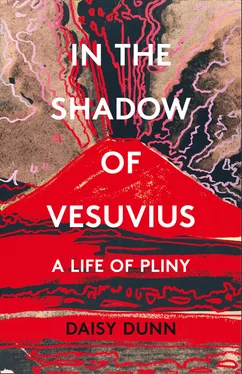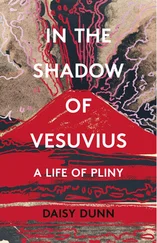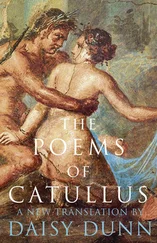Had Martial followed his own advice and waited until the lamps burned low in Pliny’s house, he would still have found him working. Bacchus was seldom frenzied when Pliny was in Rome. He was still stoppered and, if Pliny had his way, destined to remain so for as long as there were hours he could steal from night and day. Inspired by his uncle’s choice of life over deadly sleep, Pliny had established a rigorous routine of his own. In the winter months he rose early, albeit some hours later than his uncle, and worked continuously throughout the day, dispensing with both the afternoon siesta and after-dinner entertainment he normally enjoyed in summer in order to persevere with his notes. His uncle had shielded his hands from the cold with gloves, ‘so that not even the bitterness of the weather could snatch any time away from his studies’. 30Pliny relied on his underfloor heating.
There is no clearer reflection in Pliny’s letters of the kind of orderly, upright and morally unblemished life he aspired to live than in his descriptions of his occasional dinners. Pliny was almost irritatingly exacting about their composition. However much he tried to make light of it with his friends, there was no concealing the pedant inside him:
To Septicius Clarus,
How dare you! You promise to come to dinner, but never show up? Here’s your sentence: you shall reimburse the full costs to the penny. They’re not small. We had prepared: a lettuce each, three snails, two eggs, spelt with honeyed wine and snow (you shall pay for this too, a particular expense since it melts into the dish), olives, beetroot, gourds, onions, and many other choice items. You would have heard a comedy or a reader or a lyre-player or – if I was feeling generous – all three. But you no doubt chose instead to dine with someone who gave you oysters, womb of sow, sea urchins and dancing girls from Cadiz …
Plinius. 31
Lettuce, snails, eggs, spelt, snow, olives, onions: these were Pliny’s hors d’oeuvres. Too frugal to be particularly appetising and too precise in their arrangement to put a man at ease, they were the plate form of his considered and compartmentalised life. 32Lettuce, sown upon the winter solstice, was served to aid digestion, promote sleep, and regulate the appetite (‘no other food stimulates the palate more while also curbing it’). 33Eggs soothed the stomach and throat. Olives were picked for salt, and onions sliced for sweetness. Not too much of anything. Each ingredient was self-contained and recognisable to the Roman eye, the snow alone seeping everywhere.
Snow imagery was not uncommon in Pliny’s work in the years following the eruption of Vesuvius. At once a symbol of force and frailty, snow acquired a fresh resonance in his life, featuring as prominently in his oratory as it did on his dinner plates. On one level, Pliny permitted this ‘particular expense’ because it illustrated his commitment to variety. Long before William Cowper declared, in his poem of 1785, that ‘Variety’s the very spice of life,/ That gives it all its flavour’, Pliny forged a culinary metaphor for the merits of alternation. He had a friend who seemed to spend his life doing nothing. ‘For how long will your shoes go nowhere, your toga be on holiday and your day be completely empty?’ Pliny asked him. 34‘If I were to make you dinner,’ he continued, ‘I would mix the savoury and spicy foods with sweet.’
In reality, Pliny struck more balance in his menus than he did in his daily routine. Like his uncle before him, he prioritised work over everything else, food included. The snow was his one extravagance which, in its habit of losing form and metamorphosing into valueless water, must have reminded him of how consuming but unstable life and its luxuries could be. The Romans used both snow and ice to refrigerate food during transit but also, as Pliny did, to chill their drinks. Pliny the Elder found the use of snow to chill wine in summer particularly offensive because to ‘turn the curse of mountains into a pleasure for the throat’ in this season meant that thought had been given as to how to keep the snow cold for the other months. 35This made the serving of snow not a simple act of recklessness, but a conscious and determined inversion of Nature.
In the sixteenth century, the essayist Michel de Montaigne observed that the ancients also had ‘cellars of snow to cool their wine; and some there were who made use of snow in winter, not thinking their wine cool enough, even at that cold season of the year’. 36Among the classical quotations Montaigne had inscribed upon the roof beams of his chateau in Bordeaux was the following, adapted from the Natural History :
solum certum nihil esse certi
et homine nihil miserius aut superbius
The only certainty is that nothing is certain
And nothing more miserable or arrogant than man.
These words hung over Montaigne’s meditative life. 37They spoke as hauntingly to him in Renaissance France as they did to their first readers, encapsulating the idea that, of all living things, man alone struggles to accept the capriciousness of fate. Man’s desire and quest for certainty is presumptuous and arrogant; his eternal failure to achieve it, a recipe for misery.
Given his thoughts on uncertainty, we might have expected Pliny the Elder to have been the one to promote snow as a paradigm for human fortune. But it was to his nephew’s credit that he went beyond his uncle’s moralising to present snow as not merely a luxury, but as something as changeable as life itself. Pliny the Elder and Montaigne saw man’s successes in preserving snow throughout the seasons. Pliny saw rather his failures. He might strive for certainty, protecting his snow from the heat so that it retained its shape, but as someone who served snow at dinner parties, he knew only too well that even the best efforts failed. Whether it took one hour or one day, snow always melted away.
For all his uncle’s distaste for it and the similarity it bore to the ash that had eventually killed him, snow did not develop in Pliny’s mind the negative associations that it might have done. Pliny reserved his disapproval instead for the luxuries he believed to be more damaging to morality. Snow seemed less offensive in this regard than the fruits of the sea it was sometimes served with, in what his uncle viewed as a wanton ‘mixing of mountaintops and seabed’. 38In his encyclopaedia, Pliny the Elder had expressed a particular dislike of the combining of oysters and ‘snow’ – probably in this case crushed ice – as a delicacy. Ignoring the benefits of snow as a preservative, Pliny the Elder focused on how extravagant and unnatural it was that anyone should intrude upon two ends of the earth for the sake of satisfying his stomach. An oyster at the bottom of the ocean is no more likely to encounter snow than a snow-capped mountain is to host an oyster. 39
Pages and pages of the Natural History were dedicated to expounding the dangers and ubiquity of seafood. In the fourth century BC, a poet from Sicily named Archestratus had published a collection of exotic recipes for shellfish in his Greek poem, ‘On the Life of Luxury’ . Shellfish had been spreading their poison across the Greek world and into Rome for centuries. ‘It wasn’t enough,’ Pliny the Elder despaired, ‘that the gifts of the sea were being pushed down our throats before they were worn on the hands, ears, head, and all over the body by men as much as by women.’ 40The sea creatures corrupted with their treasures as much as with their taste: oysters yielded their glistening pearls to grasping fishermen, while one species of predatory murex mollusc secreted a substance, which was used by the wealthy to dye their garments ‘Tyrian’ purple.
Pliny the Elder related that Alexander the Great and his men had encountered oysters a foot long in the seas off India. Although the Romans had not yet been so fortunate, they knew of oysters large enough to merit the name ‘Three Bites’. 41The encyclopaedist had studied oysters closely and concluded that their growth depended not only upon the moon, which controlled the tides, but also upon the progress of the seasons. The oyster as he describes it in his encyclopaedia opens its shell at the beginning of summer, as the heat of the first sun penetrates the water. As it does so, it is as though it is ‘yawning’, an image that is all the more striking for the fact that the oyster’s head is ‘indistinguishable’ and lacks eyes. 42In the heat, the oyster begins to swell with a milk-like juice – a sort of dew that it absorbs and incubates to produce pearls. (In actual fact, oysters can be hermaphroditic and switch between the two genders, developing pearls when layers of nacre build up around foreign bodies trapped in their shells.)
Читать дальше












